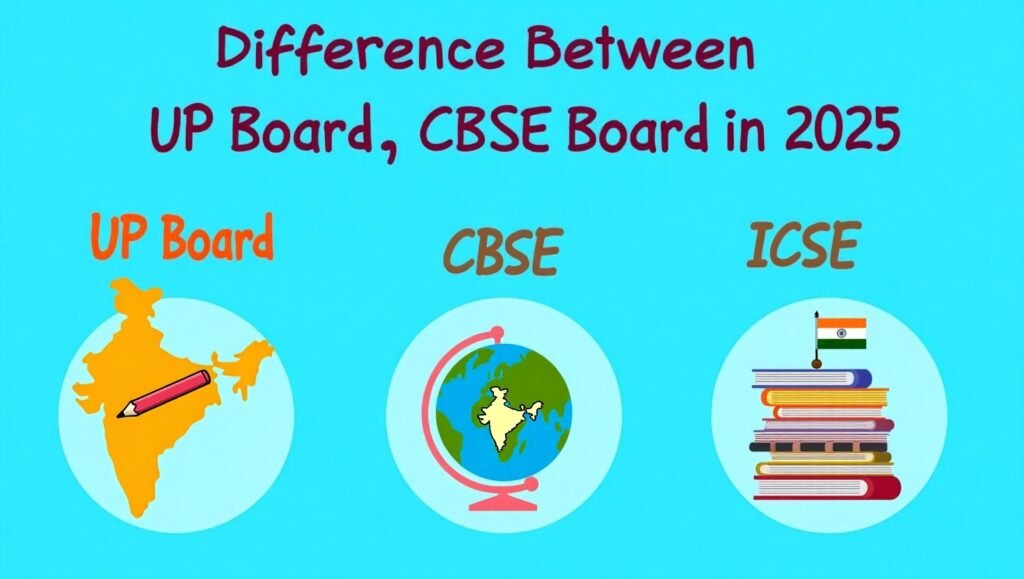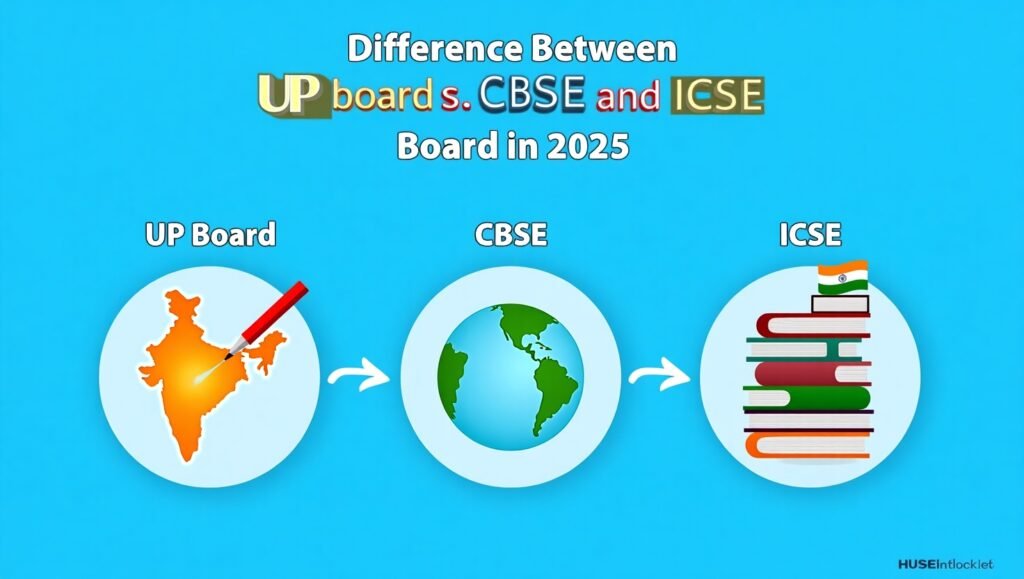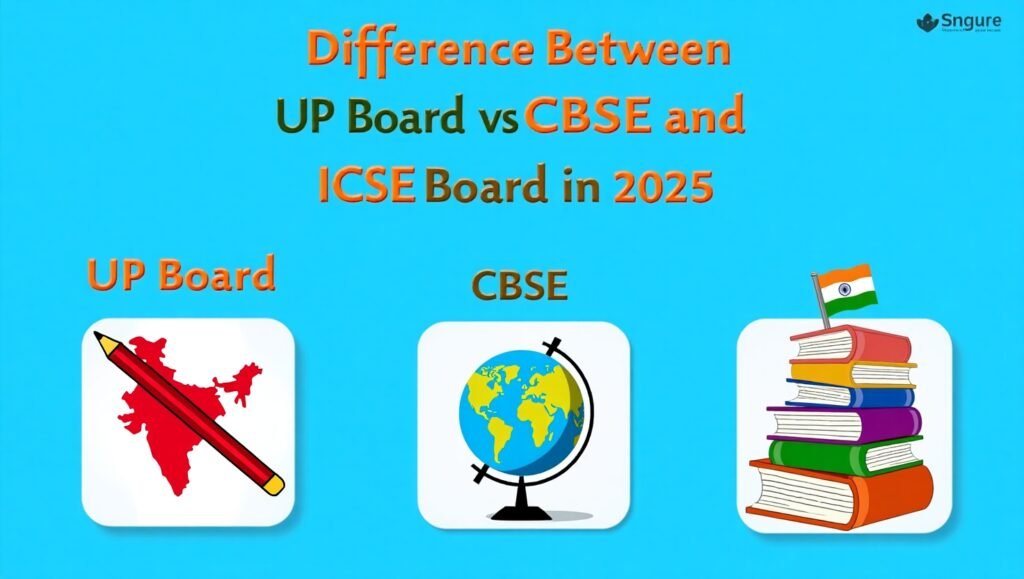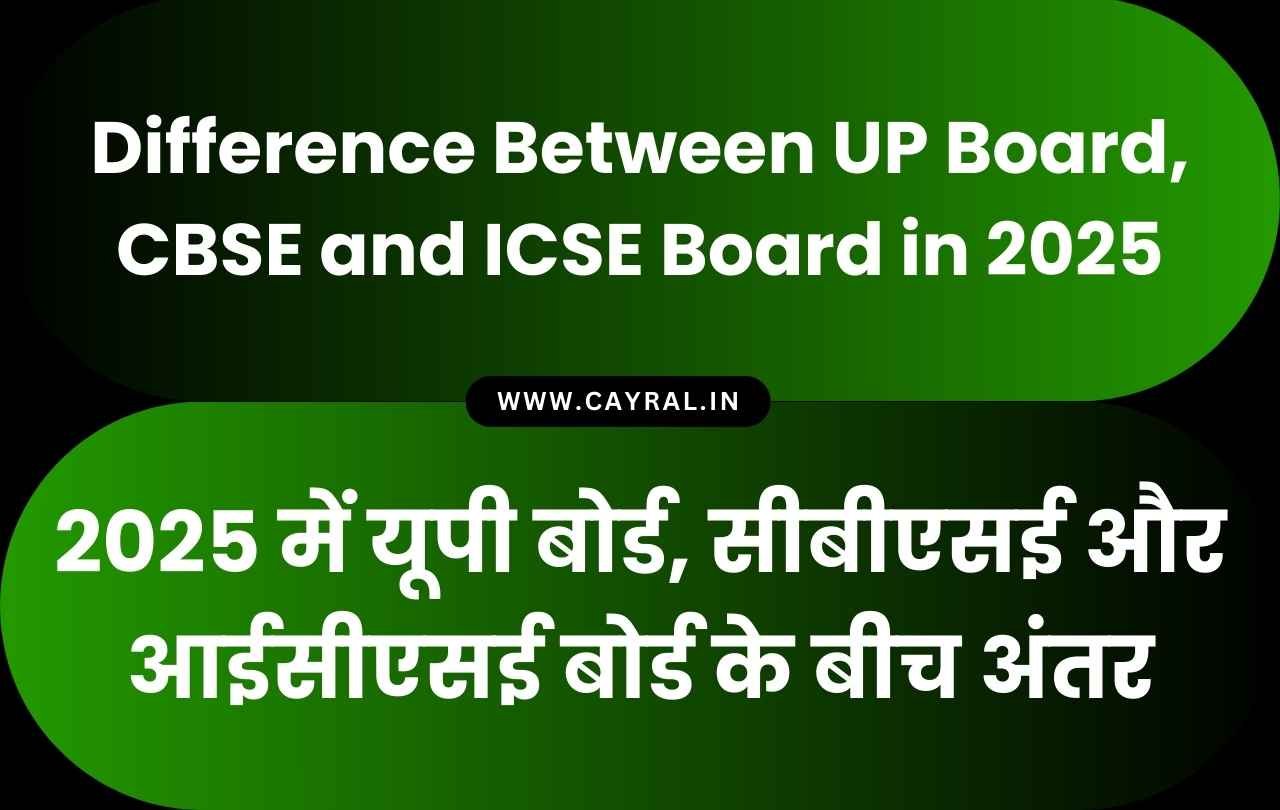Difference Between UP Board, CBSE, and ICSE Board in 2025: Choosing the right education board is crucial for students and parents as it directly impacts academic performance, future opportunities, and career growth. In India, three major education boards—UP Board, CBSE, and ICSE—have different structures, syllabuses, and evaluation patterns. This article provides a detailed comparison of UP Board, CBSE, and ICSE in 2025 to help students and parents make an informed decision.
Difference Between UP Board CBSE and ICSE Board in 2025

1. Overview of UP Board, CBSE, and ICSE
| Feature | UP Board | CBSE (Central Board of Secondary Education) | ICSE (Indian Certificate of Secondary Education) |
|---|---|---|---|
| Governing Body | Uttar Pradesh Madhyamik Shiksha Parishad (UPMSP) | Central Board of Secondary Education | Council for the Indian School Certificate Examinations (CISCE) |
| Established | 1921 | 1962 | 1958 |
| Medium of Instruction | Hindi (primarily) | English & Hindi | English |
| Syllabus Pattern | State-based curriculum | NCERT-based syllabus | Detailed, subject-intensive syllabus |
| Exam Structure | Class 10 and Class 12 Board Exams | Class 10 (AISSE) & Class 12 (AISSCE) | Class 10 (ICSE) & Class 12 (ISC) |
2. Syllabus & Curriculum Comparison
UP Board
- Follows a state-prescribed syllabus regulated by the UPMSP.
- Curriculum is designed keeping regional aspects in mind.
- Emphasis on theoretical knowledge with limited practical applications.
- Hindi is the primary language of instruction, with English as a secondary subject.
CBSE
- NCERT-based curriculum, widely accepted across India.
- Focuses on conceptual learning and practical knowledge.
- Structured to align with competitive exams like JEE, NEET, and UPSC.
- Offers a balanced approach between theory and application-based learning.
ICSE
- Comprehensive and detailed syllabus, ensuring in-depth subject knowledge.
- Greater focus on language skills, mathematics, and science.
- Encourages practical learning with project-based assessments.
- English is the primary language of instruction.
3. 10th Syllabus Comparison

UP Board 10th Syllabus (2025)
- Languages: Hindi, English, Sanskrit/Urdu
- Mathematics: Algebra, Geometry, Trigonometry, Probability, Statistics
- Science: Physics, Chemistry, Biology (theoretical focus)
- Social Science: History, Civics, Geography, Economics
- Additional Subjects: Computer Science (optional), Moral Education
CBSE 10th Syllabus (2025)
- Languages: English, Hindi/Sanskrit/Regional Language
- Mathematics: Algebra, Geometry, Trigonometry, Statistics, Arithmetic
- Science: Physics (Electricity, Magnetism), Chemistry (Chemical Reactions, Acids & Bases), Biology (Life Processes, Genetics)
- Social Science: History, Political Science, Geography, Economics
- Additional Subjects: Computer Applications, AI, Coding, Yoga
ICSE 10th Syllabus (2025)
- Languages: English (Literature & Language), Second Language (Hindi/French/Other)
- Mathematics: Advanced Algebra, Coordinate Geometry, Probability, Calculus Basics
- Science: Physics (Mechanics, Optics), Chemistry (Periodic Table, Organic Chemistry), Biology (Human Anatomy, Ecology)
- Social Science: History, Civics, Geography
- Additional Subjects: Environmental Science, Commercial Studies, Computer Applications, Home Science
4. Examination Pattern & Grading System
UP Board
- Class 10 and 12 exams are conducted annually.
- Marking system follows a percentage-based evaluation.
- The passing criteria is 33%.
CBSE
- Class 10 and 12 exams are structured with a mix of objective and subjective questions.
- Grading system (CGPA) is followed.
- Continuous and Comprehensive Evaluation (CCE) method was earlier used but has now been replaced by a revised board exam pattern.
ICSE
- Internal assessments play a significant role.
- Project work and lab reports carry weight in final grading.
- Marks-based evaluation, with a focus on analytical skills.

5. Difficulty Level & Student Preference
- UP Board: Easier compared to CBSE and ICSE due to its state-level syllabus.
- CBSE: Moderate difficulty, suited for competitive exam preparation.
- ICSE: Most detailed and extensive, requiring students to put extra effort into learning concepts deeply.
6. Recognition & Global Acceptance
| Feature | UP Board | CBSE | ICSE |
|---|---|---|---|
| Recognition in India | Limited outside UP | Recognized across all Indian states | Highly recognized in top Indian schools |
| Global Recognition | Less accepted internationally | Recognized by global universities | Preferred by foreign institutions |
| Ideal for Competitive Exams | Not structured for competitive exams | Best for JEE, NEET, UPSC | Suitable for SAT, TOEFL, IELTS |
7. Ideal Choice Based on Career Goals
- For Government Job Aspirants → UP Board is preferable as its syllabus aligns with many state-level exams.
- For Engineering & Medical Aspirants → CBSE is the best choice due to its NCERT syllabus alignment with JEE and NEET.
- For Foreign Education & Research Careers → ICSE is ideal as it emphasizes English and analytical skills.
8. Latest Changes & Updates in 2025
UP Board
- Introduction of NCERT books in some subjects for standardisation.
- Increased focus on digital learning resources.
- More practical-oriented assessments added.
CBSE
- Changes in exam structure with more competency-based questions.
- Introduction of AI and Data Science as elective subjects.
- Weightage of internal assessments increased.
ICSE
- Greater emphasis on project-based learning and coding skills.
- Increased focus on life skills and analytical subjects.
- Revised marking scheme to make assessments more flexible.
9. Conclusion: Which Board Should You Choose in 2025?
| Student Type | Recommended Board |
|---|---|
| Comfortable with Hindi & targeting state government jobs | UP Board |
| Aiming for competitive exams like JEE, NEET, UPSC | CBSE |
| Focused on English proficiency & international studies | ICSE |
Each board has its own advantages and disadvantages. Parents and students must select the board based on their long-term career aspirations.
FAQs: Difference Between UP Board, CBSE, and ICSE Board in 2025
Which board is the toughest among UP Board, CBSE, and ICSE?
ICSE is considered the toughest due to its detailed syllabus and analytical approach.
Is CBSE better than UP Board?
For competitive exams and overall academic exposure, CBSE is better. However, for state government exams, UP Board can be a good choice.
Can a UP Board student shift to CBSE or ICSE?
Yes, but students may face difficulty adapting to the different syllabus and marking patterns.
Which board is best for NEET?
CBSE is the best choice as NEET follows the NCERT syllabus.


Leave a Reply
You must be logged in to post a comment.